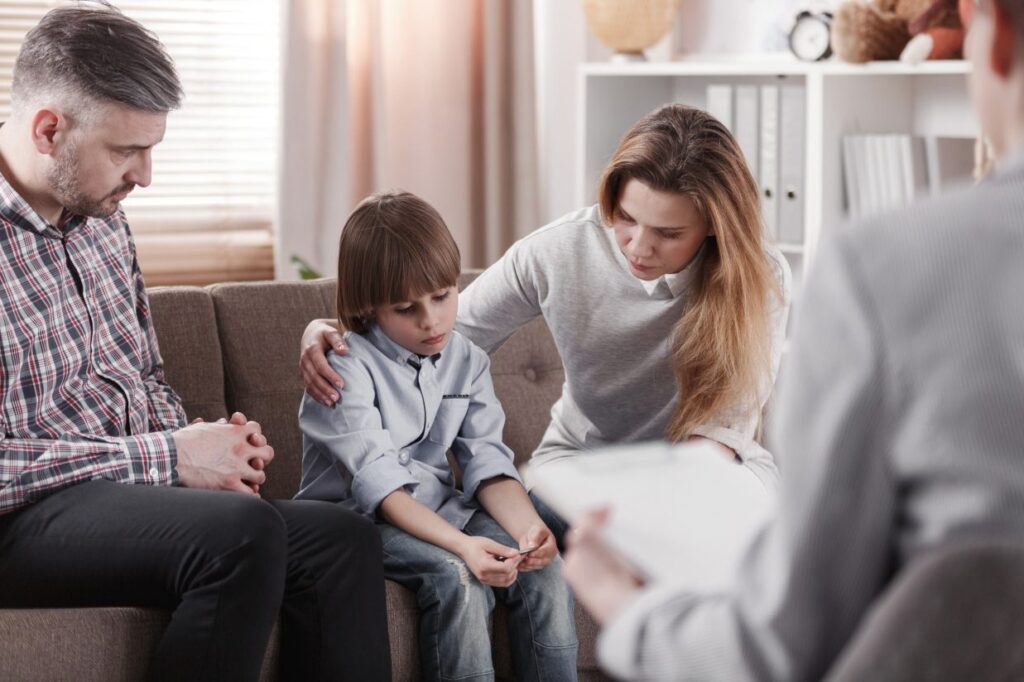How can parents deal better with their child’s mental health?

Parents dealing with mental health in children influence how they think, feel and behave. It is important to take care of our mental health as it is to take care of our physical health. You play an important role in your child’s mental health as a parent.
Reaching developmental and emotional milestones, as well as learning healthy social skills is important. Also one should know how to cope when problems arise. All these contribute to the growth of mental health during childhood. Children who are mentally healthy are more likely to have a positive quality of life. Thus they function well at home, at school, and in their societies.
Traumatic life experiences and the consequences children face

Credits:https://bit.ly/3RJfgzV
When a child faces a difficult challenge whether it’s family strife or emotional distress, it affects them in a variety of ways. There’s even a term for these kinds of negative events: adverse childhood experiences (ACEs). In brief, they are traumatising circumstances that kids encounter, such as domestic violence or divorce.
According to the National Survey of Children’s Health, one in every three children under the age of 18 has at least one adverse childhood experience (ACE), and 14% have two or more. Divorces or separations are responsible for ACEs about one-quarter of the time.
As parents dealing with mental health in children, you will not want to be accused of under-parenting or ignoring your children or over-parenting.
Parents and Mental Health in Children:
Be a wonderful role model
Don’t just tell your child what to do; walk the walk. Demonstrate them and let them learn by imitation. Humans are wired to mimic the actions of others in order to comprehend the world around them. Children, in specific, closely monitor everything their parents do. So, be the human you want your child to be—respect your child, model positive behaviour and attitude, and show empathy for your child’s emotions—and your child will surely follow.
Appreciate Their Character
As parents dealing with mental health in children, Reassurance, appreciation, and acknowledgements are all ways for parents to not only boost their child’s self-esteem and confidence but also support their mental health. According to research, low self-esteem is linked to anxiety, depression, and academic stress, all of which have a detrimental effect on a child’s quality of life. Suicidal ideation can be triggered by low self-esteem.
Spend Quality Time Together
Dedicating time as a family not only strengthens family relationships but also provides parents with much-needed face time with their children. This helps them to learn about their struggles and aspirations. It conveys the message that your children are important to you and that you are concerned about what is going on in their lives. As parents dealing with mental health in children, You will also be more likely to recognise problems in your children’s life if you spend time together on a regular basis.
Maintain Consistent Communication

Credits:https://bit.ly/3dfMVlJ
As parents dealing with mental health in children, consistent communication allows you to assist your child in problem-solving situations. You can also act as a sounding board for them to express their feelings. Open communication allows children to feel free to express their thoughts and emotions. Parents are more inclined to notice when something is wrong if they talk to their children on a regular basis.
Establish Trust
Feeling safe is one of the most basic needs of children. When children feel safe, they develop and learn properly. There is also reduced incidence of mental health issues, and when they do occur, they are simply biological implications. Creating an environment in your home where your children can discuss their feelings and struggles is one way to foster those senses of security and trust. You can accomplish this by serving as a positive role model.
Stress Management

Credits:https://bit.ly/3Le6jMB
While it is critical to protect your child from trauma including abuse and bullying, you cannot protect your child from stress. Stress is an inevitable part of life, and teaching your child how to learn to cope with it in a healthy manner now will set them to succeed in the future. Assist your child in personalizing their stress-relieving activities. While one child may find stress relief in written form in a journal, another may prefer to contact a friend when they are unhappy. So, identify specific things your child can do to keep their stress levels under control when they are going through a difficult time.
Parental mental health and child development
Mental health disorders, like many illnesses and diseases, occur in families and can be expected to pass down from parent to child. If both parents have a mental health disorder, the risk increases even more. It is critical to understand that just because a parent has a mental illness does not necessarily imply that it will have an effect on their children. Rather, it concerns how a parent’s psychological state influences their actions. Many people who suffer from anxiety, depression, or even other disorders seek treatment and go on to carry on living, healthy, and prosperous lives.
Seek Professional Advice

Credit:https://bit.ly/3RXVHDR
It may appear to be an extreme choice to make. But seeing a mental health professional for a child is never too soon. For parents dealing with mental health in children, even if only one child exhibits symptoms of poor mental health, the entire family may benefit from counselling. Counselling can help not only your child’s mental health. It can also provide assistance and resources to the parent who may be trying to cope as well.
Parents and Mental Health in Children
Dealing with depression as a parent may have an unintended effect on how you communicate with your child. For instance, you may not shape an emotional bond. This has an impact on the parent-child bond.
As parents dealing with mental health in children, it may also have an effect on your child’s physical health. Having trouble finding the energy to leave the house, or being constantly late when dropping your child off at school may endanger their academic standing. Academic difficulties may lead to negative feelings that are frequently associated with mental illnesses. These situations are stressful for both parent and child. This can deteriorate a relationship, resulting in abandonment issues or trust issues.
In Conclusion
As parents dealing with mental health in children, make an effort to keep your child as mentally stable as possible. However, if you notice any signs of trouble, communicate with your child’s doctor about your fears. Early treatment can be critical to effectively trying to treat problems. You will have created a solid foundation for your child’s mental health. By trust building, demonstrating strong interpersonal skills, and being a good role model. Remember that helping your child’s mental health involves getting them help or support when they require it.
References- https://bit.ly/3Lb7fBg
https://bit.ly/3Be05aX
https://bit.ly/3UbLwxw
https://bit.ly/3RXNAag
Tags: depression, Mental Health, mental health in children, Parents dealing with mental health in children, psychologist,









